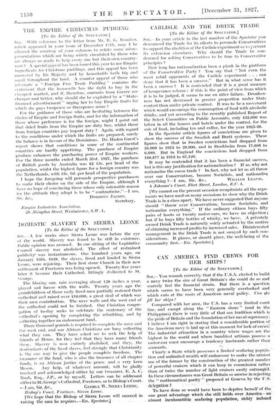CARLISLE AND THE DRINK TRADE • [To the Editor of
the SPECTATOR.]
Sur,— -In your article in the last number of the .Spectator you denounced the Trade for its efforts to persuade Conservatives to support the abolition of the Carlisle experiment or to prevent its extension elsewhere. Why should the Trade be con- demned for asking Conservatives to be true to Conservative principles ?
How long has nationalization been a plank in the platform of the Conservative Party ? You say that "Not even the most rabid opponents of the Carlisle experiment . . . can deny that it has been a success." But in what sense has it been a success ? It is contended that it is a great measure of temperance reform : if this is the point of view from which it is to be judged, it seems to me an utter failure. Drunken- ness has not decreased in greater proportion under State control than under private control. It was to be a movement which would encourage the consumption of food with alcoholic drinks, and yet according to the recently published Report of the Select Committee on Public Accounts, only 132,000 was taken in all the houses and hotels under the control, for the sale of food, including tea and coffee, for the year 1925-26.
In the Spectator article figures of convictions are given to
show the success of the Swedish and Bratt systems. These figures show that in Sweden convictions had dropped from 58,909 in 1913 to 29,900, and in Stockholm from 17,696 to 6,689. But in England the convictions had dropped from 188,877 in 1913 to 67,126.
It may be contended that it has been a financial success, but is this any justification for nationalization? If so, why not nationalize the cocoa trade ? In fact, why not let us all throw over our Conservatism, become Socialists, and nationalize
4 Johnson's Court, Fleet Street, London, E.C. 4.
[We cannot on the present occasion recapitulate all the argu-
ments we have used on many occasions to show why the Drink Trade is in a class apart. We have never suggested that anyone should "throw over Conservatism,- become Socialists, and nationalize everything." If the ordinary citizen buys fifty pairs of boots or twenty motor-cars, we have no objection ; but if he buys fifty bottles of whisky, we have. A privately owned Drink Trade is naturally solely actuated by the motive of obtaining increased profits by increased sales. Disinterested management in the Drink Trade is not swayed by such con- siderations. It places, or should place, the well-being of the community first.--En. Spectator.]


























 Previous page
Previous page